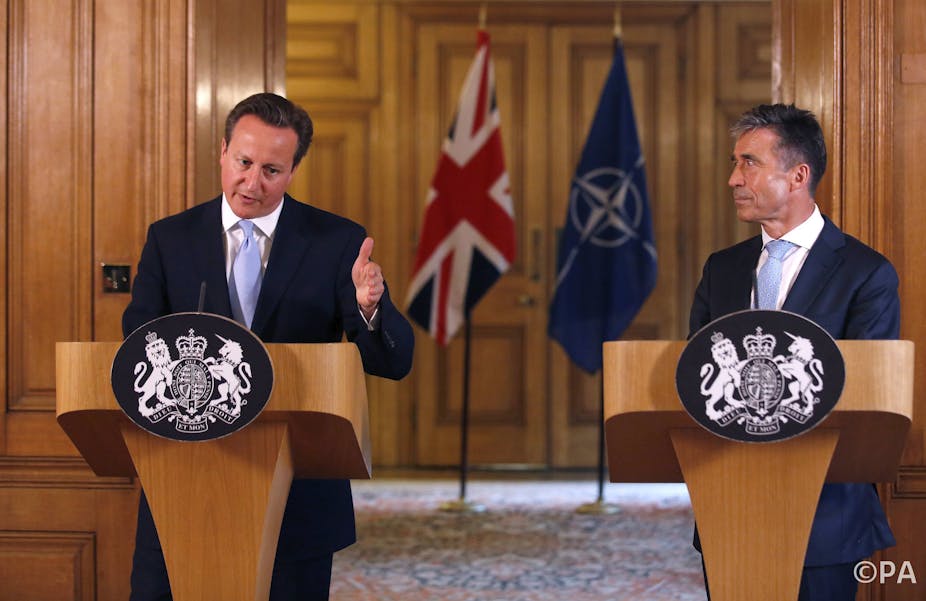NATO member states are meeting this week in Wales at what could prove a milestone summit. Since the 2012 Chicago meeting, the security landscape has changed dramatically and important questions about NATO’s performance, rationale and future direction will need to be addressed. Here’s what will be on the agenda:
1. Russia
The collective security of NATO members is high on the agenda as a result of Russia’s actions in the Crimea and eastern Ukraine.
When Malaysia Airlines flight MH17 was shot down, citizens of NATO countries were murdered. This was allegedly the result of Russia’s hybrid warfare strategy of arming dissidents and using irregulars to undermine the stability of a sovereign state.
Although Ukraine is not a NATO member, the Baltic states (Latvia, Lithuania and Estonia), are, and they have significant Russian minorities. They fear that if NATO doesn’t respond to Russian aggression and subversion by reaffirming collective defence, they could be next.
The problem is that hybrid warfare falls between articles 4 and 5 of the North Atlantic Treaty. Article 4 states: “The Parties will consult together whenever, in the opinion of any of them, the territorial integrity, political independence or security of any of the Parties is threatened.” Article 5 commits all the parties to considering “an armed attack against one or more of them in Europe or North America” as “an attack against them all”.
The difficulty lies in how far Russia’s support for dissident movements, including the arming of rebels, constitutes an “armed attack”. If collective security is to be meaningful, NATO members will have to decide where they will draw the line.
The larger problem is whether NATO needs to rethink its whole strategic relationship with Russia. Many European countries are reliant on Russian energy supplies and others, such as the UK, have strong investment links with the country. Some argue that European sanctions against Russia are “absurd” but there is no trade without security and the rule of law. Europe has to demonstrate that it will respond to aggression or risk further destabilisation in the future.
When dealing with this problem, NATO countries should avoid trying to draw parallels with the Cold War. Russia does not promote an alternative ideological position to the West in the way that the Soviet Union did. It is instead reverting to a 19th century pattern of spheres of influence, attempting to assert national pride through great power politics. Such a policy is dangerous. The anniversary of the outbreak of World War I is a reminder that national pride and great power rivalry can have terrible consequences.
2. Afghanistan
NATO forces are due to withdraw from Afghanistan at the end of the year, which poses a whole other series of challenges for NATO members. After the collapse of Iraq’s security apparatus this year, there is less room for optimism about the performance and loyalty of Afghan forces after NATO pulls out.
At a political level, the dispute over the recent presidential election seems to be a harbinger of future strife. Tribal divisions in Afghanistan are likely to lead to the fragmentation of the state along ethnic lines, as has happened in Iraq. Meanwhile, there will be worries about whether global terrorist groups might one day return to exploit the security vacuum.
3. 21st century NATO
The Afghanistan debate also feeds into the third major item on the agenda in Wales – pondering the future of NATO in the 21st century.
NATO members need to decide if their involvement in Afghanistan was an anomaly or a blueprint for the future. In the wake of 9/11, distance no longer seemed to matter when it came to evaluating threats, and terrorist networks became joined in the minds of decision makers, who started to believe that a more global counter-terrorist approach was required.
In July, Anders Fogh Rasmussen, the NATO Secretary General, described Europe as encircled by an “arc of instability” stretching from the Middle East and North Africa to the Sahel and David Cameron has repeated this refrain. But the danger of overstating the global dynamics of terrorism is that it can lead to an exaggerated sense of threat. It can also imply strong connections between groups and crises across the globe when these may, in reality, be quite superficial.
These crises are better understood as a series of discrete problems whose causes and solutions are primarily local and NATO is not always the best organisation to deal with them. Military action might be immediately necessary to confront the Islamic State in Iraq and Syria, but political and civilian solutions will have to be sought in the longer term.
In extending its operational reach beyond the Atlantic area, NATO could be in danger of diluting its original purpose – the defence of that zone – and could end up morphing into a global security organisation. This may allow it to confront diffuse threats abroad but, the more members, partners and tasks it takes on, the more fragile its collective security guarantee will become.
NATO policymakers in Newport should dare to rethink how “global” most military security challenges really are and consider whether terrorism does constitute the main threat to their citizens or if it is actually the more immediate and tangible problem of Russia.

